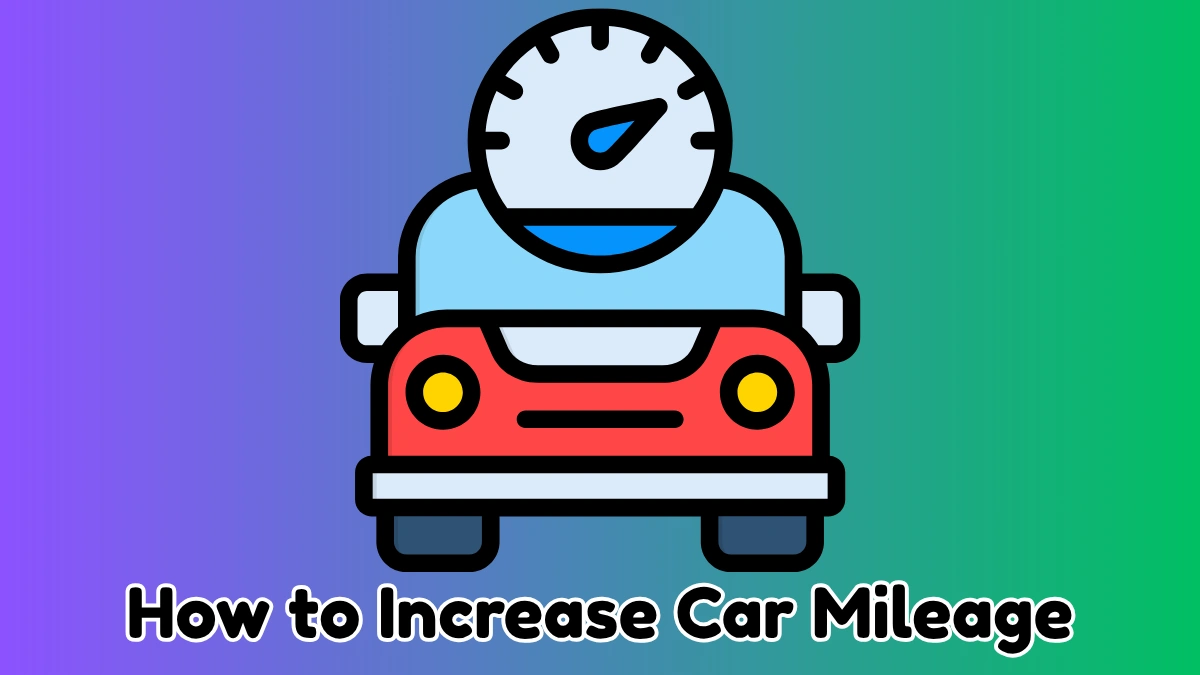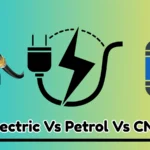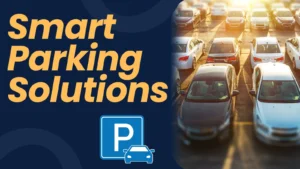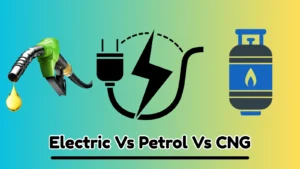Want to save money on fuel and make every drop count? If you’re looking for simple, practical ways to increase your car mileage fast, you’re in the right place. Whether you’re a daily commuter, a road-trip enthusiast, or just someone who’s tired of spending too much at the pump – this guide is for you.
In this detailed post, you’ll learn easy tips to improve car mileage, reduce fuel consumption, and extend the life of your vehicle. From smart driving habits to simple maintenance tricks, everything you need is here – broken down in a friendly, beginner-style tone that even first-time car owners can follow.

Let’s dive into the best ways to get better mileage and save fuel starting today.
How to Increase Car Mileage – Tips & Reasons Why They Work
| Tips to Increase Car Mileage | Why It Works |
|---|---|
| Maintain Proper Tyre Pressure | Correct pressure reduces rolling resistance, helping the engine work efficiently. |
| Drive Smoothly Without Sudden Acceleration | Smooth driving avoids fuel-wasting surges and unnecessary braking. |
| Regular Engine Servicing | Keeps the engine clean and efficient, reducing fuel consumption. |
| Use Manufacturer-Recommended Engine Oil | Right viscosity reduces internal friction, boosting fuel efficiency. |
| Avoid Idling for Long Durations | Idling burns fuel without any movement, lowering mileage. |
| Reduce Unnecessary Load in the Car | Less weight means the engine works less, saving fuel. |
| Maintain Constant Speeds on Highways | Reduces fuel spikes caused by frequent acceleration or deceleration. |
| Keep Windows Closed at High Speeds | Open windows create drag, increasing fuel use at highway speeds. |
| Use Higher Gears When Appropriate | Lower gears consume more fuel; higher gears are more fuel-efficient. |
| Avoid Overusing Air Conditioning | AC puts extra load on the engine, reducing mileage. |
| Choose Less Congested Routes | Avoids frequent stopping and starting, which burns more fuel. |
| Shift Gears Smoothly in Manual Cars | Abrupt gear changes strain the engine and reduce fuel economy. |
| Use Cruise Control on Open Roads | Helps maintain steady speed, improving highway mileage. |
| Monitor Your Fuel Consumption Regularly | Helps detect drops in mileage and fix issues early. |
| Use Quality Fuel From Trusted Stations | Better fuel means better combustion and cleaner engine performance. |
| Remove Roof Racks or Carriers When Not Needed | These increase air resistance and reduce aerodynamics. |
| Don’t Rev the Engine Unnecessarily | High RPM burns more fuel without performance gain. |
| Drive During Cooler Parts of the Day in Summer | Reduces AC load and helps the engine run cooler. |
| Combine Short Trips into One | Cold starts use more fuel; combining trips improves fuel use. |
| Park in the Shade | Keeps the cabin cool, reducing AC use after startup. |
| Use Navigation to Avoid Traffic Jams | Minimizes fuel wasted in stop-go traffic situations. |
| Warm Up the Engine Gently (In Winters) | Prevents rough driving early on, preserving mileage. |
| Close Fuel Cap Tightly | Prevents fuel evaporation and maintains pressure in fuel system. |
| Get Wheel Alignment Checked Periodically | Misalignment increases drag and uneven tire wear, affecting fuel economy. |
| Clean or Replace Air Filters When Needed | Dirty filters block airflow, leading to poor combustion and more fuel use. |
Section 1: Understanding Car Mileage – Why It Matters
Mileage Is More Than Just Numbers – It’s About Money, Efficiency & Performance.
Car mileage, often measured in kilometers per liter (km/l) or miles per gallon (MPG), is a direct indicator of how efficiently your car uses fuel. Higher mileage means fewer fuel stops, less money spent, and a cleaner environment.
But most people don’t realize how small habits and neglect can silently reduce mileage. Poor driving styles, bad maintenance, and added vehicle weight can all lower your mileage significantly.
Improving your car’s mileage isn’t just about saving cash – it’s also about being smarter with how your car performs every day.
Section 2: Basic Car Maintenance for Better Mileage
A Healthy Car Always Runs Farther.
Keeping your car in good shape is the easiest way to boost car mileage. Here’s what you should regularly check:
Tire Pressure
Underinflated tires increase rolling resistance, which means your engine has to work harder. Keep tires inflated to the manufacturer’s recommended levels for smoother rides and better fuel use.
Engine Oil
Always use the correct engine oil grade. It reduces friction inside the engine, allowing smoother performance and improved fuel efficiency.
Air Filter
A clogged air filter blocks airflow to the engine. Replacing it ensures proper air-fuel mix, leading to better mileage.
Spark Plugs
Old spark plugs misfire, waste fuel, and reduce power. Replacing them can restore lost mileage and performance.
Oxygen Sensor
A faulty O2 sensor can cause poor fuel-to-air ratios. Replacing a worn sensor can drastically improve mileage.
These small fixes go a long way when you’re aiming to get more out of every liter.
Section 3: Driving Habits That Boost Mileage
Smart Driving = More Miles and Less Money.
Your driving style has a massive impact on your fuel usage. Here are smart, everyday driving habits to follow:
-
Avoid sudden acceleration and hard braking. Smooth transitions save more fuel.
-
Use cruise control on highways. It helps maintain steady speeds, improving highway mileage.
-
Don’t idle for long. If you’re stopping for more than 30 seconds, turn off your engine.
-
Shift gears smoothly. If you drive a manual, shifting at the right RPM improves fuel use.
-
Coast when possible. Let the car move naturally when going downhill or approaching a red light.
These driving habits are among the simplest ways to save fuel while driving daily.
Lighten the Load & Reduce Drag
Heavy Cars Drink More Fuel — Travel Light.
Every 100 kg of extra weight can reduce mileage by 1–2%. To get better fuel economy:
-
Remove unnecessary items from the trunk and seats.
-
Take off roof racks or boxes when not in use — they increase drag.
-
Keep windows closed at high speeds. Open windows create wind resistance, which reduces efficiency.
Want to improve highway mileage? Start by making your car lighter and more aerodynamic.
Section 5: Route Planning & Smart Navigation
Shorter Routes = Lower Fuel Use.
Driving less doesn’t just save time, it saves fuel too. Try this:
-
Use navigation apps like Google Maps or Waze to avoid traffic jams.
-
Plan your day’s errands in one route rather than multiple trips.
-
Avoid routes with steep inclines and constant stop-and-go traffic.
One of the best tips to improve fuel economy is to simply drive smarter, not harder.
Section 6: Fuel Quality and Filling Tips
What Goes In Determines What You Get Out.
Low-quality fuel can hurt mileage and damage the engine. Always:
-
Use fuel from trusted stations.
-
Avoid overfilling the tank – stop when the nozzle clicks.
-
Try to refuel during cooler times of the day (early morning or late evening) for denser fuel.
-
Don’t wait until the tank is almost empty – sediments can clog the filter, reducing efficiency.
If you’re serious about how to save fuel in your car, start paying attention to what goes into it.
Section 7: City Driving vs Highway Efficiency
Subtitle: Adjust Your Strategy Based on Where You Drive.
City driving involves more stops, starts, and idling – all of which reduce mileage. Here’s how to increase mileage of car in city:
-
Use low gears only when needed.
-
Keep your foot off the clutch (in manual cars) when not shifting.
-
Combine errands to reduce the number of short trips.
-
Maintain distance from the car ahead to avoid constant braking.
On highways, you can increase car mileage fast by maintaining a steady speed, using cruise control, and avoiding aggressive lane changes.
Section 8: Advanced Fuel Saving Tips
Go the Extra Mile with These Smart Hacks.
Looking for extra ways to stretch your fuel? Try these car mileage boosting hacks:
-
Use eco-driving mode, if your car has it.
-
Warm up your car minimally before driving, especially in summer.
-
Keep your fuel cap sealed tightly to prevent evaporation.
-
Avoid short trips, as engines use more fuel when cold.
-
Try “pulse and glide” technique on open roads (accelerate gently, then coast).
These advanced driving habits can increase your car average more than you think.
Section 9: Special Tips for Petrol and Diesel Cars
Different Fuels, Different Needs.
For Petrol Cars:
-
Avoid aggressive acceleration – petrol burns faster.
-
Keep revs under control to prevent fuel waste.
-
Regularly check ignition system and injectors.
For Diesel Cars:
-
Warm up the engine gently – diesel engines take longer to reach peak efficiency.
-
Don’t let it idle too long – modern diesels are built to shut off quickly.
-
Use fuel additives to clean injectors and improve combustion.
Following fuel-specific habits helps increase petrol car mileage or diesel efficiency effectively.
Section 10: Long Drive Fuel Saving Tips
Going Far? Make Every Drop Count.
Planning a road trip? Here’s how to get better mileage on the highway:
-
Pack light and smart – distribute weight evenly.
-
Use cruise control wherever possible.
-
Keep speed steady – ideal range is usually 55–65 mph (90–105 km/h).
-
Limit AC usage – use ventilation when cruising at night.
By prepping right, you’ll boost mileage and enjoy a smoother ride.
Differences Between BS6 and BS4 Engines.
Conclusion: Drive Smart, Save Fuel, Live Better
Improving your car’s mileage doesn’t require expensive modifications. Just a few simple changes in driving behavior, regular maintenance, and smart fuel choices can lead to big savings over time.
Whether you’re looking to boost car mileage in city traffic, on highways, or over long drives, applying even a few of these tips will give noticeable results.
Save fuel, save money, and drive smart. Your wallet and the planet will thank you.
10+ Best Mileage Cars In India.
Frequently Asked Questions (FAQs)
What is the best way to increase car mileage?
Maintaining tire pressure, driving smoothly, and keeping your engine tuned are the most effective ways.
Does using AC affect fuel efficiency?
Yes, using AC can reduce mileage slightly. Use it wisely, especially in stop-and-go traffic.
How can I improve fuel efficiency without changing my car?
Focus on regular maintenance, smart driving, and reducing vehicle weight.
Can fuel additives help boost mileage?
Some high-quality additives clean injectors and improve combustion, which may slightly help.
Is city or highway driving better for mileage?
Highway driving typically offers better mileage due to steady speeds and fewer stops.
Do automatic cars consume more fuel?
Modern automatics are more efficient than older ones, but manuals still offer better mileage in some cases.
How often should I check tire pressure?
At least once a month and before long trips.
Can engine tuning really improve fuel economy?
Yes, a well-tuned engine runs smoother and uses less fuel.
Rahul Panchal, 25, is an automotive reviewer with a keen eye for detail and a passion for all things on wheels. Whether it’s cars or bikes, Rahul brings an expert touch to every review, diving deep into performance, design, and the driving experience. With a love for both speed and style, he provides insightful, honest, and engaging reviews that help readers make informed decisions. When he’s not testing out the latest models, Rahul is sharing his thoughts, fueling the excitement for fellow motor enthusiasts with his informative and lively reviews.



![BS6 Vs BS4 Engines – Key Differences, Emission Impact & Which One to Buy in 2025 | [Fuel Efficiency, Pollution, Cost Guide]](https://autohunt.in/wp-content/uploads/2025/05/BS6-Vs-BS4-Engines-150x150.webp)



